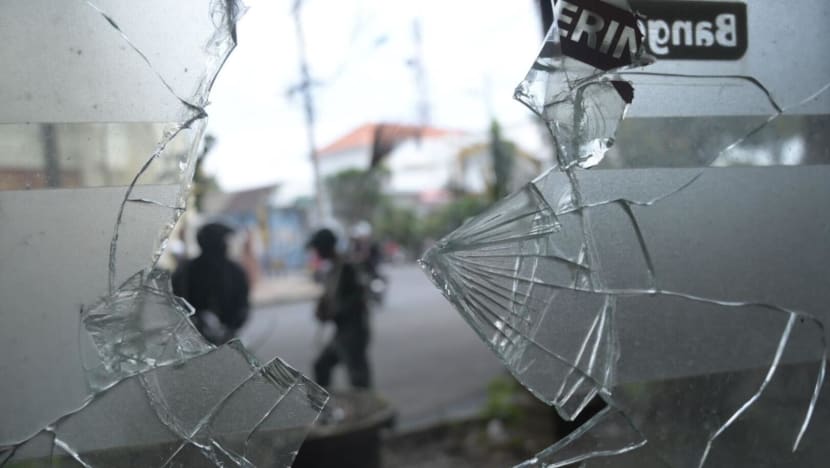World
Protests Erupt in Indonesia Over Police Violence and Allowance Hikes

Violent protests erupted across Indonesia on August 29, 2023, as public outrage reached a tipping point. Demonstrators in Jakarta and several other cities expressed their frustration over lawmakers’ perceived insensitivity to the economic hardships faced by ordinary citizens. This unrest was exacerbated by the police-related death of a motorcycle taxi driver during a prior protest against recent increases in lawmakers’ allowances.
The protests began after the death of Affan Kurniawan, a 21-year-old delivery driver who was struck by a police armored vehicle while he was not participating in the protests. His tragic death sparked widespread anger, leading to clashes with police and targeting of government buildings. The situation escalated quickly, with protesters attacking police stations and the national parliament.
Political analysts have expressed concern that the growing unrest could pose a significant threat to President Prabowo Subianto’s administration. Following the violence, Prabowo called for an investigation into police actions, but many viewed this response as merely a formality. Analysts argue that concrete actions are necessary to address public grievances and prevent further unrest. Political analyst Kunto Adi Wibowo from Padjadjaran University noted that Prabowo appears detached from the realities faced by the populace, saying, “His statement ultimately failed to achieve its purpose of calming the public.”
Violent Clashes and Damage Across Cities
The aftermath of the protests left Jakarta in disarray, with burned vehicles and damaged public infrastructure. The Mobile Brigade headquarters in Central Jakarta bore the brunt of the violence, with remnants of the chaos evident in the form of charred car frames and damaged bus shelters. Graffiti criticizing police actions marked the walls of key government buildings, demonstrating the depth of public outrage.
Protests were not limited to Jakarta; cities such as Makassar, Surabaya, Bandung, and Yogyakarta also witnessed violent demonstrations. In Makassar, three protesters lost their lives when clashes escalated to the point of setting fire to the provincial parliament building. The unrest signifies a shift in public demands, now focusing not only on the lawmakers’ allowance hikes, which increased to 50 million rupiah (approximately USD 3,075), but also on condemning police brutality.
Political analyst Ambang Priyonggo from Universitas Multimedia Nusantara remarked, “This escalation was predictable,” highlighting that the combination of public frustration and police violence has intensified the situation.
Government Response and Future Implications
The protests have highlighted a broader discontent with the government, particularly regarding perceived insensitivity from lawmakers. Some legislators have made dismissive remarks towards the protests, further fueling public anger. Ahmad Sahroni, a member of the National Democratic Party (Nasdem), referred to protesters demanding parliamentary dissolution as “the dumbest people in the world,” illustrating the disconnect between lawmakers and the electorate.
The ruling coalition, which holds approximately 81 percent of the 580 seats in the House, has faced criticism for its lack of oversight and failure to represent the public effectively. Political analyst Agung Baskoro from the Trias Politika institute stated, “They’ve become little more than a rubber stamp for the government,” emphasizing the need for legislative accountability.
In response to the escalation, House Speaker Puan Maharani issued an apology on behalf of the legislature, acknowledging failures in representing the public. Yet analysts like Kunto argue that such apologies come too late and that meaningful policy changes, including reversing the allowance hike, are critical to addressing public discontent.
As the unrest continues, the implications for President Prabowo remain uncertain. Though historical context suggests that significant protests can lead to political change, such as the fall of President Suharto during the 1998 Asian financial crisis, analysts like Ray Rangkuti from the Lingkar Madani think tank believe Prabowo’s leadership is not at immediate risk. He noted, “Judging from the scale of the unrest, it is unlikely to spread to Prabowo.”
Nonetheless, analysts warn that unresolved issues could trigger a more significant backlash against the government. Prabowo’s recent statements expressing support for Affan’s family and his call for police reforms have been viewed as steps in the right direction, but pressure remains for comprehensive reform within the police force and broader governmental changes.
The situation in Indonesia remains volatile, with the potential for further protests looming as public dissatisfaction continues to simmer. As the government grapples with these challenges, the future of Prabowo’s administration may depend largely on its ability to respond effectively to the voices of its citizens.
-

 Lifestyle4 months ago
Lifestyle4 months agoHumanism Camp Engages 250 Youths in Summer Fest 2025
-

 Business5 months ago
Business5 months agoKenvue Dismisses CEO Thibaut Mongon as Strategic Review Advances
-

 Sports4 months ago
Sports4 months agoDe Minaur Triumphs at Washington Open After Thrilling Comeback
-

 Sports5 months ago
Sports5 months agoTupou and Daugunu Join First Nations Squad for Lions Clash
-

 Top Stories5 months ago
Top Stories5 months agoColombian Senator Miguel Uribe Shows Signs of Recovery After Attack
-

 World5 months ago
World5 months agoASEAN Gears Up for Historic Joint Meeting of Foreign and Economic Ministers
-

 Health4 months ago
Health4 months agoNew Study Challenges Assumptions About Aging and Inflammation
-

 Business5 months ago
Business5 months agoOil Prices Surge Following New EU Sanctions on Russia
-

 Entertainment4 months ago
Entertainment4 months agoDetaşe-Sabah Violin Ensemble Captivates at Gabala Music Festival
-

 Entertainment4 months ago
Entertainment4 months agoBaku Metro Extends Hours for Justin Timberlake Concert
-

 Top Stories5 months ago
Top Stories5 months agoRethinking Singapore’s F&B Regulations Amid Business Closures
-

 Business5 months ago
Business5 months agoU.S. House Approves Stablecoin Bill, Sends to Trump for Signature









